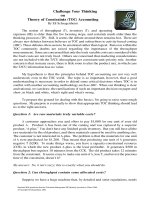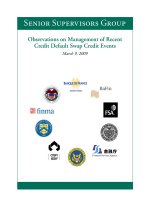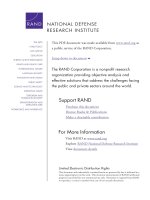BIOTECHNOLOGY Conducted by TNS Opinion & Social on request of European Commission
Bạn đang xem bản rút gọn của tài liệu. Xem và tải ngay bản đầy đủ của tài liệu tại đây (7.52 MB, 385 trang )
Special Eurobarometer
Biotechnology
Report
Fieldwork : January 2010 – February 2010
Publication: October 2010
Special Eurobarometer 341 / Wave 73.1 – TNS Opinion & Social
This survey was requested and coordinated by the Directorate-General for Communication
(“Research and Speechwriting” Unit)
This document does not represent the point of view of the European Commission.
The interpretations and opinions contained in it are solely those of the authors.
European
Commission
Eurobarometer 73.1
BIOTECHNOLOGY
Conducted by TNS Opinion & Social on request of
European Commission
Survey co-ordinated by
Directorate General Research
TNS Opinion & Social
Avenue Herrmann Debroux, 40
1160 Bruxelles
Belgique
Special EUROBAROMETER 341 “Biotechnology”
- 1 -
Table of contents
INTRODUCTION 3
EXECUTIVE SUMMARY 7
1. EUROPEAN CITIZENS’ OPTIMISIM ABOUT TECHNOLOGY 9
2. AWARENESS OF AND ATTITUDES TOWARDS BIOTECHNOLOGY 13
2.1 Awareness of genetically modified foods 13
2.1.1: Attitude towards genetically modified foods 18
2.2 Awareness of nanotechnology 33
2.2.1: Attitude towards nanotechnology 38
2.3 Awareness of animal cloning 52
2.3.1 Attitude towards animal cloning 58
2.4 Gene transfer 73
2.4.1: Awareness and attitude towards horizontal gene transfer 74
2.4.2: Awareness and attitude towards vertical gene transfer 86
2.5 Awareness of regenerative medicine 97
2.5.1: Attitude towards regenerative medicine 100
2.6 Approval of stem cell research, transgenic animal research and human
gene therapy 115
2.7 Awareness of synthetic biology 124
2.7.1 Attitude towards synthetic biology 127
2.8 Awareness of biofuels 134
2.9 Awareness of biobanks 137
2.9.1: Attitude towards biobanks 142
3 ATTITUDES TOWARDS THOSE RESPONSIBLE FOR BIOTECHNOLOGY 153
3.1 Who do Europeans think are doing a good job for society? 153
3.1.1: Medical doctors 154
Special EUROBAROMETER 341 “Biotechnology”
- 2 -
3.1.2: University scientists 156
3.1.3: Consumer organisations 157
3.1.4: Environmental groups 158
3.1.5: The media 159
3.1.6: Ethics committees 160
3.1.7: Retailers 161
3.1.8: The European Union 162
3.1.9: Industry 163
3.1.10: Government 164
3.1.11: Religious leaders 165
3.2 Attitudes towards decisions about synthetic biology 167
3.2.1: Scientific evidence or moral and ethical issues? 167
3.2.2: Expert advice or public opinion? 169
3.2.3: Government regulation or market driven? 172
3.3 Attitudes towards decisions about animal cloning 174
3.3.1: Scientific evidence or moral and ethical issues? 174
3.3.2: Expert advice or public opinion? 177
3.3.3: Government regulation or market driven? 180
4 CONTROL, BENEFITS AND BELIEFS ABOUT BIOTECHNOLOGY 182
4.1 The role of government in new technologies 182
4.2 The effect on climate change and global warming 184
4.3 General political views 191
5 INVOLVEMENT WITH BIOTECHNOLOGY 195
5.1 Personal feelings regarding biotechnology 195
5.2 Personal scientific background 198
5.3 Personal religious background 203
CONCLUSION 206
Special EUROBAROMETER 341 “Biotechnology”
- 3 -
INTRODUCTION
Europe faces major structural challenges – globalisation, climate change and an ageing
population – to name but a few. The economic downturn has made these issues even
more pressing. On 3 March 2010, the European Commission launched the Europe 2020
Strategy which is designed to help the Union to come out stronger from the current
economic and financial crisis and to prepare its economy for the next decade’s
challenges. It aims to stimulate growth and create more and better jobs, while making
the economy greener and more innovative
1
.
Biotechnology can be seen as a major driver in the health and well-being of European
citizens
2
. The EU has undertaken many initiatives in recent years to stimulate and
coordinate biotechnology developments. Although there is a strong chemical and
agricultural base in the EU, environmental protection issues, consumer safety
concerns, strong environmental movements and little social acceptance have been
seen as factors which affect its overall development.
Biotechnology can be defined as "any technological application that uses biological
systems, living organisms, or derivatives thereof, to make or modify products or
processes for specific use."
3
Biotechnology is in itself not new: using biological systems
to make products has been known since the early civilisations and knowledge of how
animals and plants can be crossbred to better suit a purpose can be traced back to the
ancient Egyptians.
The advancements in the 1970s and early 1980s in molecular genetics, in particular,
opened up the possibility of specifically selecting the part of a gene or genes
responsible for the production of a particular attribute in a plant or animal, such as the
production of an enzyme, a chemical with pharmacological activity, resistance to
particular diseases and so on. These genes could then be either multiplied to increase
the effect and or even added to an entirely different micro-organism, plant or animal.
1
Lisbon Strategy evaluation document. Brussels, 2.2.2010 SEC (2010) 114 final
/>
2
3
Definition of biotechnology used by the United Nations Convention on Biological Diversity (CBD) is "any
technological application that uses biological systems, living organisms, or derivatives thereof, to make or
modify products or processes for specific use."
Special EUROBAROMETER 341 “Biotechnology”
- 4 -
This technology, which developed into genetic engineering
4
, opened up the possibility
of modifying living matter in a targeted way beyond traditional breeding techniques.
With these advancements came the concern that man could now modify nature in a
way that does not happen in the natural world itself, with the potential for unforeseen
consequences. This became a dominant issue in public opinion. The early development
of modern biotechnology and genetic engineering saw a large gap between what the
scientific community understood to be the risks and benefits and what was understood
by the general public. In addition, products introduced on the market in the early days
were hampered by almost universal resistance from the public where the supporting
arguments of companies making the products were not accepted, probably not widely
understood or not even heard of.
The data from this survey are analysed in depth, including trends analysis, in a
separate report produced by the project “Sensitive technologies and European public
ethics” (STEPE)
5
, funded by the European Commission under the 7
th
Framework
Programme for Research and Technological Development
6
. Readers are encouraged to
refer to that report.
The following points are analysed in five chapters, namely:
♦ Level of optimism about technology
♦ Attitudes and awareness towards biotechnology
♦ Attitudes towards those responsible for biotechnology
♦ Control, beliefs and benefits of biotechnology
♦ Involvement in biotechnology
The findings of this survey have been analysed, firstly, at EU level and, secondly, by
country. Where appropriate, a variety of socio-demographic variables - such as
respondents’ gender, age, education and occupation - have been used to provide
additional analysis. Many of the questions listed as topics above have also been used
4
Genetic engineering, recombinant DNA, genetic modification/manipulation (GM), and gene splicing are
terms that apply to the direct manipulation of an organism’s genes. Genetic engineering is different from
traditional breeding where the organism's genes are manipulated indirectly.
5
Collaborative project grant agreement SiS-CT-2008-217815
6
Special EUROBAROMETER 341 “Biotechnology”
- 5 -
as key variables in the analysis to gain a deeper insight into Europeans’ views on
biotechnology
7
.
This Eurobarometer survey is commissioned by the European Commission’s Directorate
General (DG) for Research and is coordinated by the Directorate-General for
Communication. It was carried out by TNS Opinion & Social network in February 2010.
The methodology used is that of Eurobarometer surveys as carried out by the
Directorate General for Communication (“Research and Speechwriting” Unit)
8
. A
technical note on the manner in which interviews were conducted by the Institutes
within the TNS Opinion & Social network is appended as an annex to this report. This
note indicates the interview methods and the confidence intervals.
7
In some cases, due to the rounding of figures, displayed sums can show a difference of one point with the
sum of the individual cells. Also, note that the total percentages shown in the tables of this report may
exceed 100% where the respondent is allowed to give several answers to a particular question.
8
Special EUROBAROMETER 341 “Biotechnology”
- 6 -
In this report, the countries are represented by their official abbreviations. The
abbreviations used in this report correspond to:
ABREVIATIONS
EU27 European Union – 27 Member States
BE
Belgium
BG Bulgaria
CZ Czech Republic
DK Denmark
D-E East Germany
DE Germany*
D-W West Germany
EE Estonia
EL Greece
ES Spain
FR France
IE Ireland
IT Italy
CY Republic of Cyprus**
LT Lithuania
LV Latvia
LU Luxembourg
HU Hungary
MT Malta
NL The Netherlands
AT Austria
PL Poland
PT Portugal
RO Romania
SI Slovenia
SK Slovakia
FI Finland
SE Sweden
UK United Kingdom
HR
Croatia**
TR Turkey**
CH
Switzerland***
IS Iceland***
NO Norway***
*
Cyprus as a whole is one of the 27 European Union Member States. However, the “acquis communautaire”
is suspended in the part of the country that is not controlled by the government of the Republic of Cyprus.
For practical reasons, only the interviews conducted in the part of the country controlled by the government
of the Republic of Cyprus are recorded in the category “CY” and included in the EU27 average. The
interviews conducted in the part of the country not controlled by the government of the Republic of Cyprus
are recorded in the category “CY(tcc)” [tcc: Turkish Cypriot Community].
**
Croatia and Turkey are in 2010 candidate countries of the EU.
***
Switzerland, Iceland and Norway are not EU Member States but belong to the European Free Trade
Association (EFTA).
Special EUROBAROMETER 341 “Biotechnology”
- 7 -
EXECUTIVE SUMMARY
The key findings of this survey are that Europeans :
♦ are divided in their optimism about biotechnology and genetic engineering;
♦ do not see benefits of genetically modified food, consider genetically modified
foods to be probably unsafe or even harmful and are not in favour of
development of genetically modified food;
♦ are generally unaware of nanotechnology, do not have a solid view of benefits
but are not excessively alarmed about potential negative consequences. Even
though understanding of nanotechnology is low, Europeans feel that it should
be encouraged;
♦ have strong reservations about animal cloning in food production and do not
see the benefits, and feel that it should not be encouraged;
♦ do not see the benefits of horizontal gene transfer
9
, have strong reservations
about safety, feel that special labelling of food products is necessary, and do
not feel that it should be encouraged;
♦ accept the potential benefits of vertical gene transfer
10
, have some reservations
about safety and the potential impact on the environment, feel marginally that
it should be encouraged but that special labelling of food products is necessary;
♦ consider that the science of regenerative medicine should be allowed to develop
but have strong reservations about ethical issues, such as the use of human
embryos, that should not be brushed aside for the sake of scientific progress;
♦ approve of stem cell research, transgenic animal research and human gene
therapy although strict laws are needed to alleviate concern about ethical
issues;
♦ are not aware of synthetic biology given that only 17% of Europeans have
heard of the science. The level of acceptance is correspondingly low;
♦ feel that biofuels should be encouraged and that development of sustainable
biofuels is overwhelmingly supported;
9
Horizontal gene transfer is a process in which an organism incorporates genetic material from another
organism without being the offspring of that organism.
10
Vertical gene transfer where an organism receives genetic material from its ancestor for example a parent
or the species from which it was evolved.
Special EUROBAROMETER 341 “Biotechnology”
- 8 -
♦ have heard of biobanks but have reservations about biobanks storing personal
information and materials even if they tend to be favourable to the exchange of
such information between member countries;
♦ think that medical professionals and university academics are the best advisers
for issues concerning biotechnology;
♦ feel that decisions about synthetic biology should be preferably left to scientific
experts but that strong regulation by government is necessary;
♦ feel that moral and ethical issues should influence decisions about animal
cloning and that regulation by government is necessary;
♦ believe that government should take responsibility for ensuring that benefits
are for all, but are not convinced that governments will act accordingly;
♦ believe that protecting human rights is favoured more than fighting crime and
terrorism;
♦ believe that reducing economic inequalities is more important than having
strong global companies;
♦ express a need to rethink the way we live our lives to halt climate change and
prevent global warming and that this view is shared by many;
♦ feel somewhat strongly about biotechnology;
♦ rarely have close family who are involved with science, but over half have
studied science at some level.
Special EUROBAROMETER 341 “Biotechnology”
- 9 -
1. EUROPEAN CITIZENS’ OPTIMISIM ABOUT TECHNOLOGY
In the first chapter, we briefly look at the level of optimism Europeans show for
biotechnology and genetic engineering by comparing this with a range of other
technological issues.
In order to gauge how European citizens feel about biotechnology and genetic
engineering, respondents are asked on a range of issues whether each issue will have
a positive, negative or no effect on their way of life in the next twenty years
11
.
The graph below shows that the technologies which more obviously concern the
environment are seen as the most positive by respondents. Solar energy at 87% of
respondents and wind energy at 84% are seen as having the most positive effect on
their way of life. These are followed by computers and information technology which
77% of respondents believe will have a positive effect on our way of life in the next 20
years, then, brain and cognitive enhancement (59%) and, lastly, biotechnology and
genetic engineering at a slim majority of 53%.
11
QB1 I am going to read out a list of areas where new technologies are currently developing. For each of
these, do you think it will have a positive, a negative or no effect on our way of life in the next 20 years?
QB1.1 Solar energy; QB1.2 Computers and Information Technology; QB1.3 Biotechnology and genetic
engineering; QB1.4 Space exploration; QB1.5 Nuclear energy; QB1.6 Nanotechnology; QB1.7 Wind energy;
QB1.8 Brain and cognitive enhancement.
Special EUROBAROMETER 341 “Biotechnology”
- 10 -
The graph above also shows that less than a majority of respondents see space
exploration (47%), nanotechnology (41%) and nuclear energy (39%) as having a
positive effect. This may be seen as an indication that respondents are not very
familiar with the role and implications of some of the technologies, with 40% of
respondents stating that they ‘don’t know’ of the effects of nanotechnology, and 20%
not having an opinion about either biotechnology and genetic engineering, or brain and
cognitive development technologies.
On the other hand, nuclear energy is seen as giving the least positive effect but
respondents here have a clear, albeit opposed, view point: 39% see it as positive and
39% see it as negative.
Focussing specifically on biotechnology and genetic engineering, the survey shows that
it is seen by a slim majority of 53% of European respondents as being a positive
influence on their way of life. The country results, however, highlight a wide difference
in opinion or knowledge about the subject. The graph below shows that Iceland has the
highest proportion of respondents who see biotechnology and genetic engineering as
positive (79%), followed by respondents in Estonia (77%). At the other end of the
scale, only 38% of respondents in Bulgaria see biotechnology and genetic engineering
as positive, whereas 22% see the science as negative. In Austria, while 35% of
respondents see biotechnology and genetic engineering as positive, a larger proportion
(41%) sees the science as negative.
In addition, for some countries, there are many respondents who do not know: in
Malta, 46% of respondents are positive but 43% do not know; similarly, in Bulgaria,
38% of respondents are positive and 36% do not know.
Special EUROBAROMETER 341 “Biotechnology”
- 11 -
When we look at the socio-demographic data for biotechnology and genetic
engineering, we see that there are some differences between the social groups. Men
are more likely to see biotechnology and genetic engineering as positive compared to
women (58% vs. 48%). And, women, far more often than men, have no opinion (24%
vs. 16%).
Special EUROBAROMETER 341 “Biotechnology”
- 12 -
Those who stayed in full-time education until the age of 20 or older, students, heavy
users of the internet, managers and those who see themselves as higher on the social
scale are most likely (at 60% or more) to consider its influence positively and are least
likely to have no opinion. Looking at the potential effect of religious beliefs, we see
that 49% of respondents who believe in God are positive about the technology in
contrast to 59% of non-believers. However, no differences on the basis of religion are
apparent in the proportion of respondents who consider the science negatively.
Special EUROBAROMETER 341 “Biotechnology”
- 13 -
2. AWARENESS OF AND ATTITUDES TOWARDS BIOTECHNOLOGY
In this second chapter, we look at European citizens’ awareness and attitudes towards
biotechnology. We examine major branches of the technology: genetically modified
foods; nanotechnology; animal cloning; gene transfer; regenerative medicine; stem
cell research; synthetic biology; biofuels and biobanks
12
.
2.1 Awareness of genetically modified foods
- Widespread awareness –
A large majority of Europeans, 84% at EU27 level, have heard of genetically modified
foods
13
. Only 16% have never heard of them. The bar chart below shows the variation
between countries. Norway has the most respondents who have heard of genetically
modified foods (96%), followed by those in Germany at 95%, as well as in Finland and
the Netherlands (both 93%).
At the other end of the scale, Malta is the only country where fewer than half (49%)
have heard of genetically modified foods. Portugal at 59%, Turkey and Austria at 68%,
Slovakia at 69%, Romania at 70% and Hungary, Spain and Belgium at 74% are the
only other countries where fewer than three quarters of respondents have heard of
genetically modified foods.
12
Some questions were only asked to half of the sample (see questionnaire).
13
QB2a Have you ever heard of genetically modified (or GM) foods before? The questions about GM foods
were asked to half of the sample (Split Sample A).
Special EUROBAROMETER 341 “Biotechnology”
- 14 -
Looking at the socio-demographic data, the table below shows that managers, at 96%,
are the most likely to have heard of genetically modified foods. Those who consider
themselves to be higher on the social ladder (89%), everyday users of the internet
(90%) and those with a scientific background (89%) are also more likely than average
to have heard about genetically modified foods.
Special EUROBAROMETER 341 “Biotechnology”
- 15 -
Respondents who have heard of genetically modified foods were further questioned
about whether they had talked with anyone about genetically modified foods before
14
.
On average, two thirds of these respondents at EU27 level have talked about
genetically modified foods before. The bar chart below shows that this figure ranges
from 45% in Turkey to 82% in Austria.
14
QB3a.1 Have you ever talked about GM food with anyone before today?
Special EUROBAROMETER 341 “Biotechnology”
- 16 -
When we look at the socio-demographic data, we see that managers (82%) are the
most likely to have talked about genetically modified foods before. This is also the case
for those who are more frequent users of the internet, higher on the social ladder or
who have a background in science.
Further questioning of respondents who have heard of genetically modified foods
looked at whether they had themselves actively searched for information
15
.
15
QB3a.2 Have you ever searched for information about GM food?
Special EUROBAROMETER 341 “Biotechnology”
- 17 -
The table below shows that, on average, only 38% of these Europeans had done so.
Looking at the country differences, only two countries are observed where the number
of respondents who have searched for information outnumbers that of those who have
never done so: in both Greece and Switzerland, 54% of respondents have and 46%
have not searched for information on genetically modified foods.
The socio-demographic data show that managers (56%) most often report having
searched for information about genetically modified foods. Younger people, those who
stayed in full-time education the longest, those on the political left and frequent
internet users are also more likely to search for such information.
Special EUROBAROMETER 341 “Biotechnology”
- 18 -
Having a science background is a powerful determinant: 45% of those with a science
background have searched for information about genetically modified foods compared
to 28% of those without this background.
2.1.1: Attitude towards genetically modified foods
The attitude of respondents towards genetically modified (GM) foods is examined by
asking respondents whether they agree or disagree with a series of statements
16
:
The survey reveals an overall suspicion of GM foods amongst the European public. A
high proportion, 70%, agrees that GM food is fundamentally unnatural. 61% of
Europeans agree that GM food makes them feel uneasy. In addition, 61% of Europeans
disagree that the development of GM food should be encouraged, 59% disagree that
GM food is safe for their health and that of their family, and 58% disagree that GM
food is safe for future generations.
16
QB4 For each of the following issues regarding GM food please tell me if you agree or disagree with it…
QB4a.1 GM food is good for the (NATIONALITY) economy; QB4a.2 GM foods is not good for you and your
family; QB4a.3 GM food helps people in developing countries; QB4a.4 GM food is safe for future generations;
QB4a.5 GM food benefits some people but puts others at risk; QB4a.6 GM food is fundamentally unnatural;
QB4a.7 GM food makes you feel uneasy; QB4a.8 GM food is safe for your health and your family’s health;
QB4a.9 GM food does no harm to the environment. QB4A.10 The development of GM food should be
encouraged.
Special EUROBAROMETER 341 “Biotechnology”
- 19 -
These findings are further analysed at country level.
- Less than a third believes that GM food is good for the economy –
The chart below shows that, on average, 50% of Europeans disagree that GM food is
good for their national economy. Respondents in Slovenia (78%) and Croatia (77%)
most strongly disagree. At the other end of the scale, respondents in Spain are the
least likely to disagree, with only 29% doing so. In addition, 40% of respondents in
Spain agree. Only in two other countries are there more respondents who agree rather
than disagree: Denmark, where 39% disagree and 48% agree, and the United
Kingdom, where 36% disagree and 43% agree. In no country are there more than half
of respondents who agree that GM food is good for the national economy.
Special EUROBAROMETER 341 “Biotechnology”
- 20 -
Looking at the socio-demographic data, we see that those who are aware of GM food
are more likely to disagree (53%) that GM food is good for the national economy than
those who are not aware of GM food (37%). In fact, 33% of those who are aware of
GM foods agree, compared to 20% of those who are not aware about it.
Looking at the effect of religion on attitudes, the survey shows that those who believe
in God less often agree (27%) than those who believe in a higher spirit (35%) or non-
believers (36%).
- Majority of Europeans believes GM foods are not good for them -
On average, a slim majority of 54% of Europeans agrees that GM food is not good for
themselves or their family. Country variations are considerable with 80% of
respondents in Latvia and 78% in Greece agreeing that GM food is not good, while,
only 37%of respondents in Malta, 39% in Ireland and 40% in the United Kingdom hold
this view. A high proportion of respondents both in Ireland (35%) and in Malta (33%)
give a ‘don’t know’ response. Public opinion is divided in the Netherlands, the United
Kingdom and the Czech Republic.
Special EUROBAROMETER 341 “Biotechnology”
- 21 -
On examining the socio-demographic data, we see that there is very little variation.
Awareness of GM food is, again, a major factor in shaping attitudes, with those who
have heard of it (57%) being more likely to agree with the statement than those who
have not heard of it (35%).
Special EUROBAROMETER 341 “Biotechnology”
- 22 -
- Two in five agree that GM food helps people in developing countries -
On average, 43% of respondents agree that GM food helps people in developing
countries, while 37% of respondents disagree. In addition, a high proportion (20%) of
them do not know. Agreement is highest in Iceland (66%) and Denmark (65%). On
the other hand, there is broad disagreement in Turkey (66%) and Greece (62%). In
Malta and Greece (39% each), close to 2 out of 5 respondents have no opinion.









